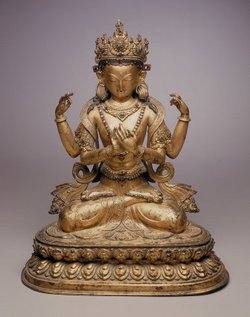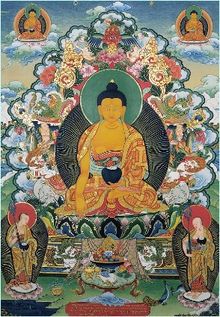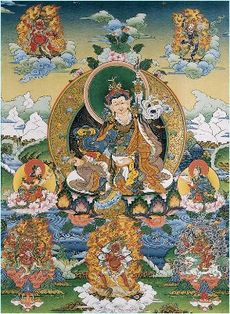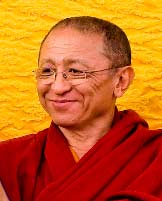The Rangjung Yeshe Gilded Palace of Dharmic Activity: Difference between revisions
No edit summary |
No edit summary |
||
| Line 1: | Line 1: | ||
<div style="top:+0.2em;font-size: 110%"> | <div style="top:+0.2em;font-size: 110%"> | ||
<center>'''~~ | <center>'''~~ <span class=TibUni20>[[རང་བྱུང་ཡེ་ཤེས་ཕིབ་རྒྱ་དཀོན་མཆོག་ཕོ་བྲང་ཆོས་ཀྱི་ཕྲིན་ལས།]]</span> ~~'''</center></div> | ||
---- | ---- | ||
<center>'''''~~ A Glossary of Buddhist People, Places, and Things...~~'''''</center> | <center>'''''~~ A Glossary of Buddhist People, Places, and Things...~~'''''</center> | ||
Revision as of 01:37, 15 March 2008
 ཤེར་ཕྱིན་མ། (picture source unknown) |
--Alphabetical Listing:
"It is all right not to know the Tibetan language. As long as you can read, you can absorb the Dharma terminology, the Buddhist key words. Many learned people have told me that the majority of Buddhist scriptures exist in the Tibetan language. Second is Chinese; after that there is Japanese, Pali, and so forth. Nevertheless, Tibetan is foremost in quantity. Someone who wants to do detailed studies, can study to their heart's delight in the Tibetan medium, without running out of texts".
Quoted from an interview with Chokyi Nyima Rinpoche
Note: To review the images above, their source, more details and availability, please see http://www.thangka.ru/gallery_e.html. Thank you Nick!
(Review other Categories)
-A Work in Progress) --Richard 09:01, 11 March 2008 (EDT) (RWB)


